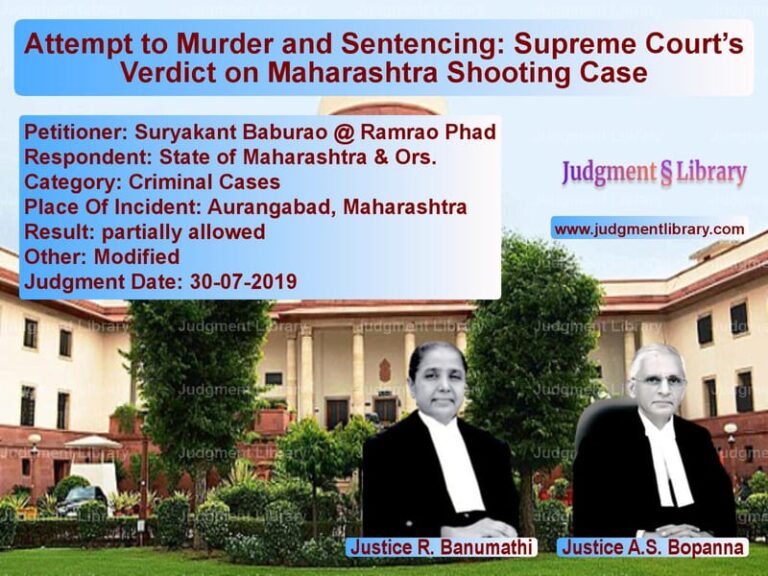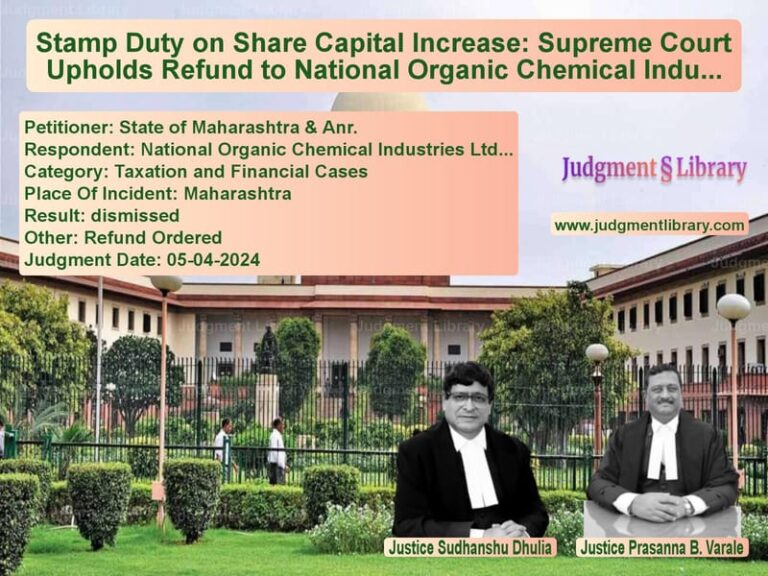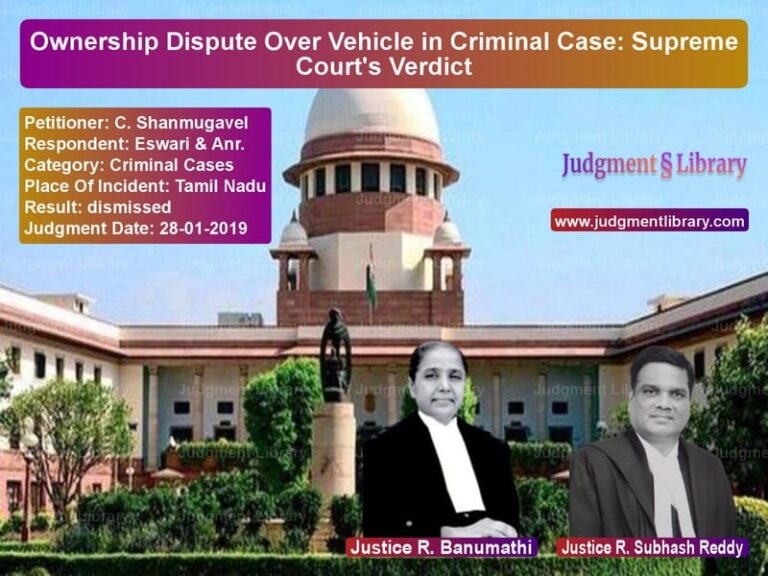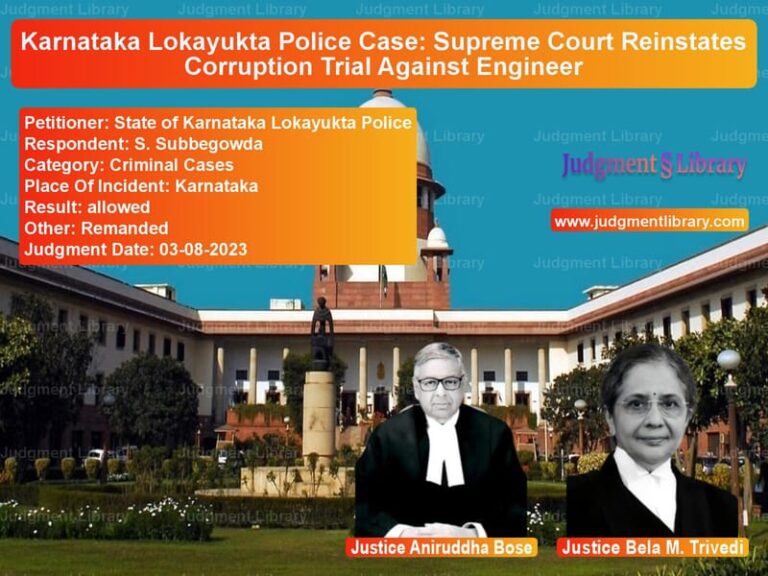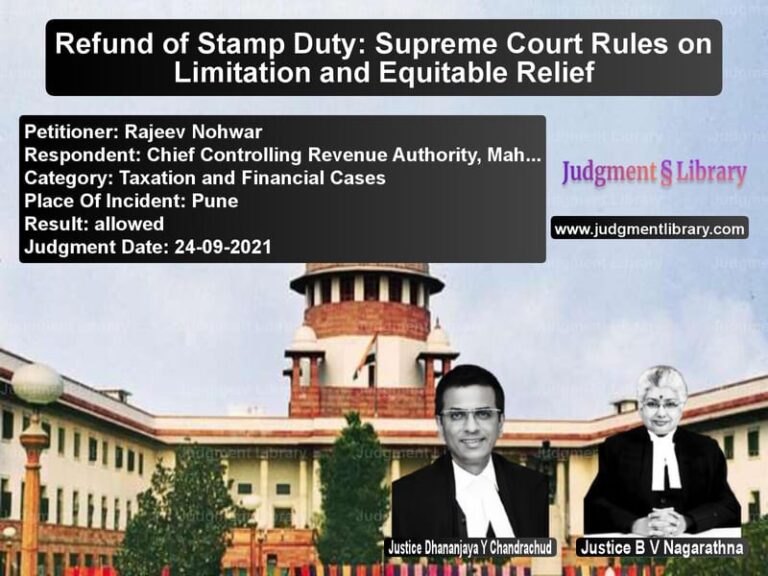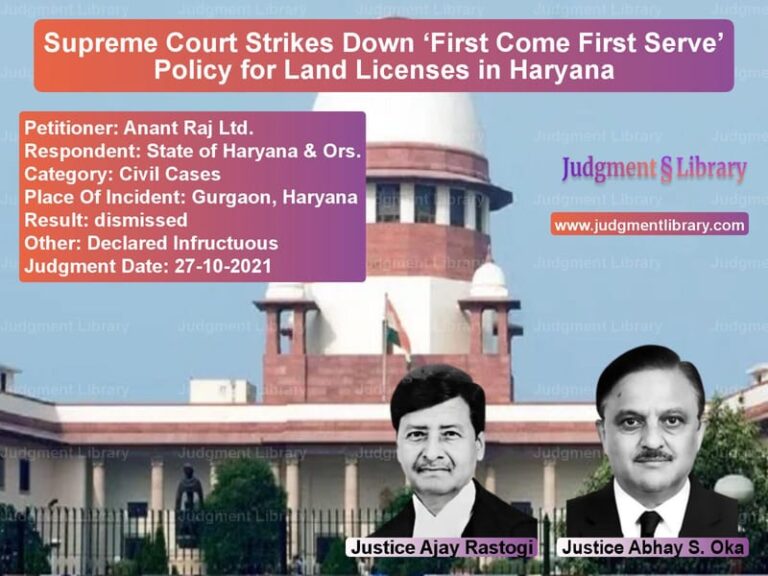Contempt of Court in Property Disputes: Supreme Court’s Ruling on Willful Disobedience
The Supreme Court of India recently delivered a crucial judgment in the case of Balwantbhai Somabhai Bhandari v. Hiralal Somabhai Contractor (Deceased) & Ors., addressing the issue of contempt of court arising from the willful violation of an undertaking given to the court. This case brings to light the legal implications of disobeying judicial orders, particularly in property transactions, and the severe consequences that follow such violations.
Background of the Case
The case pertains to a property dispute in which the petitioner, Balwantbhai Somabhai Bhandari, had given an undertaking before the court not to transfer or alienate a disputed property during the pendency of the case. Despite this commitment, the petitioner proceeded with the sale of the property, leading to contempt proceedings initiated by the respondents.
Read also: https://judgmentlibrary.com/supreme-court-restores-criminal-proceedings-in-dishonored-cheque-case/
The trial court found the petitioner guilty of contempt, imposing penalties and directing remedial measures. The Gujarat High Court upheld the decision, reinforcing the importance of honoring undertakings given before the court. Aggrieved by the ruling, the petitioner approached the Supreme Court, challenging the findings of contempt and seeking relief from the penalties imposed.
Key Legal Issues Before the Supreme Court
- Whether the petitioner’s act of selling the disputed property constituted willful disobedience of the court’s undertaking.
- Whether the principles of contempt law justified the penalties imposed by the lower courts.
- Whether any mitigating circumstances existed that could excuse or reduce the petitioner’s liability.
Arguments by the Petitioner
The petitioner contended the following:
- The sale of the property was carried out due to financial distress and was not intended to undermine the authority of the court.
- The petitioner was not adequately informed of the legal consequences of violating an undertaking given to the court.
- The penalty imposed was excessively harsh and disproportionate to the nature of the violation.
- The transaction had been executed in good faith, and the petitioner was willing to offer compensation to the affected party.
Arguments by the Respondents
The respondents opposed the petitioner’s claims, asserting:
- The petitioner had acted in clear and deliberate defiance of the undertaking given to the court.
- The act of selling the property while the case was still pending demonstrated a blatant disregard for judicial authority.
- Contempt proceedings were justified to maintain the integrity of the judicial process and deter future violations.
- Any relaxation of penalties would set a dangerous precedent, allowing parties to disregard court orders with impunity.
Supreme Court’s Analysis
1. Legal Framework for Contempt of Court
The Court examined the legal provisions governing contempt, including the Contempt of Courts Act, 1971. The Act defines civil contempt as willful disobedience of a court order or undertaking, and it provides the courts with broad authority to penalize such violations.
The Court emphasized the importance of upholding the sanctity of judicial undertakings, stating:
“A party who, having given an undertaking to the court, willfully breaches the same, commits contempt and must be held accountable to preserve the sanctity of judicial proceedings.”
2. Willfulness of the Contemptuous Act
The Court considered whether the petitioner’s violation was intentional or the result of unavoidable circumstances. It noted:
“The petitioner was fully aware of the undertaking and its legal consequences, and yet proceeded with the sale. Such conduct amounts to deliberate defiance of the court’s authority.”
The Court dismissed the petitioner’s argument that financial distress justified the violation, holding that economic difficulties do not excuse disobedience of a binding legal commitment.
3. Impact on the Judicial System
The Supreme Court highlighted that allowing parties to violate undertakings without consequences would undermine the rule of law. It observed:
“If such violations are overlooked, it will embolden litigants to make false promises before the court, only to disregard them later when convenient.”
The Court stressed that upholding court orders is essential to maintaining public confidence in the legal system.
4. Punishment and Deterrence
Regarding the penalty, the Court affirmed that contempt punishments should be both corrective and deterrent. It upheld the penalties imposed by the lower courts, stating:
“The punishment imposed serves not only to penalize the contemnor but also to deter future violations of court orders.”
Supreme Court’s Judgment
The Supreme Court dismissed the petitioner’s appeal and upheld the contempt ruling. The key directives included:
- The petitioner was ordered to compensate the affected party for losses incurred due to the illegal property transaction.
- A fine was imposed on the petitioner as a punitive measure.
- The petitioner was warned that any further violations could result in imprisonment.
The Court concluded:
“The solemnity of an undertaking given to the court cannot be taken lightly. Courts must exercise their contempt jurisdiction to ensure compliance and uphold the integrity of judicial proceedings.”
Implications of the Judgment
This ruling has significant legal implications:
- Strengthening the Authority of Court Undertakings: The judgment reaffirms that court orders and undertakings are binding and cannot be disregarded at will.
- Setting a Precedent for Property Disputes: The case clarifies that violating a court’s directive in property transactions can lead to serious legal consequences.
- Ensuring Compliance with Judicial Orders: The ruling acts as a deterrent against non-compliance with court orders, ensuring that litigants adhere to their commitments.
Conclusion
The Supreme Court’s ruling in Balwantbhai Somabhai Bhandari v. Hiralal Somabhai Contractor (Deceased) & Ors. serves as a strong warning against willful disobedience of court undertakings. By enforcing strict penalties, the Court has reinforced the importance of compliance with judicial directives, ensuring the integrity of the legal process is upheld.
Petitioner Name: Balwantbhai Somabhai Bhandari.Respondent Name: Hiralal Somabhai Contractor (Deceased) & Ors..Judgment By: Justice J.B. Pardiwala, Justice Manoj Misra.Place Of Incident: Gujarat.Judgment Date: 06-09-2023.
Don’t miss out on the full details! Download the complete judgment in PDF format below and gain valuable insights instantly!
Download Judgment: balwantbhai-somabhai-vs-hiralal-somabhai-con-supreme-court-of-india-judgment-dated-06-09-2023.pdf
Directly Download Judgment: Directly download this Judgment
See all petitions in Property Disputes
See all petitions in Contract Disputes
See all petitions in Damages and Compensation
See all petitions in Landlord-Tenant Disputes
See all petitions in Specific Performance
See all petitions in Judgment by J.B. Pardiwala
See all petitions in Judgment by Manoj Misra
See all petitions in dismissed
See all petitions in supreme court of India judgments September 2023
See all petitions in 2023 judgments
See all posts in Civil Cases Category
See all allowed petitions in Civil Cases Category
See all Dismissed petitions in Civil Cases Category
See all partially allowed petitions in Civil Cases Category


